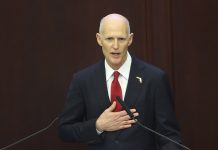TALLAHASSEE, Fla. (AP) — Florida Gov. Rick Scott, who was a multimillionaire businessman before he ran for office, is trying to convince an appeals court to end a long-running battle over whether he is flouting the state’s financial disclosure law.
Attorneys for the Republican governor clashed Tuesday with a Tallahassee attorney and one-time top fundraiser for former President Barack Obama who contends that Scott is underreporting his vast personal wealth. Scott recently reported a net worth of $232 million to the state, but that does not include assets held by his wife, Ann Scott.
Instead during the nearly hour-long hearing, Scott’s general counsel urged judges to prohibit a lower court from even considering the lawsuit filed last year by attorney Don Hinkle. Daniel Nordby contended that any disputes over whether Scott is following the law must be considered by the state’s ethics commission and not the courts.
Hinkle asserted that he had the right to pursue his lawsuit once the ethics commission rejected his complaint. He said the panel of political appointees “shouldn’t be the end of the road” for citizens seeking to force elected officials to follow the law. Noting that Scott once headed a company that became the target of a federal investigation, Hinkle added “Maybe we should be able to check his homework here.”
The battle over Scott’s finances, which the governor’s office has previously criticized as a “publicity stunt,” comes as the two-term governor is challenging U.S. Sen. Bill Nelson. Scott used his wealth to help pay for his two campaigns for governor and is expected to do so again this year. He will be forced to divulge more financial information later this month as part of his U.S. Senate race.
Scott’s filings for 2017 showed the governor made $120 million last year but his filings do not explain how he made that much money. Several news stories, however, have pointed out that a Michigan auto parts company controlled by Scott and his family was sold for $825 million to a Japanese conglomerate in early 2017.
Scott, who does not accept a salary, first built his fortune as the head of the hospital giant Columbia/HCA. He was forced out of the job amid a federal investigation into fraud. Although Scott was never charged with any wrongdoing, the company paid a then-record $1.7 billion fine for Medicare fraud.
In 2014, a Democratic candidate running for attorney general, filed a lawsuit that alleged Scott may have underreported his actual wealth by as much as $200 million. The lawsuit was eventually tossed out by a judge who said it needed to be considered by the ethics commission. Hinkle independently filed complaints with the commission, but that panel concluded Scott was following the law.
During his re-election campaign four years ago, Scott briefly dissolved his blind trust and released joint tax returns with his wife that gave a much broader picture of his finances. The tax returns showed that Scott’s family earns millions more than the governor reported he earned individually. Hinkle’s lawsuit contends that Scott has control over a family trust with his wife Ann and has failed to disclose all of its assets.














